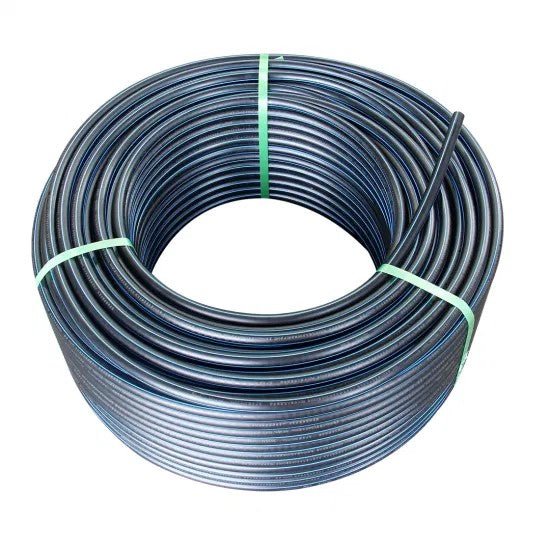Understanding the Secret Perks of HDPE Pipe for Water and Wastewater Management
Making use of HDPE pipeline in water and wastewater administration offers various benefits that merit consideration. Its remarkable durability and long life expectancy make it a favored selection for several jobs. Furthermore, the material's resistance to corrosion and chemical damage improves its reliability in numerous environments. The benefits extend beyond just durability and resistance. hdpe pipe in stock Midland TX. Discovering its cost-effectiveness and environmental effect reveals also a lot more engaging factors for its prevalent adoption in contemporary facilities
Outstanding Sturdiness and Longevity

HDPE pipe stands apart for its extraordinary durability and durability, making it a preferred choice in water monitoring systems. Built from high-density polyethylene, these pipelines can hold up against significant pressure and stress, guaranteeing reliable performance over time. Their robust nature enables them to endure severe environmental conditions, consisting of temperature level variations and soil activities, which can trigger other products to fail.
The life-span of HDPE pipes typically exceeds half a century, offering an affordable solution for districts and markets alike. Furthermore, the product's lightweight homes streamline setup, reducing labor expenses and durations. This toughness reduces the demand for frequent repair services or replacements, even more improving its economic charm.
In water monitoring applications, the reliability of HDPE pipelines suggests fewer interruptions and boosted service continuity, making them important to lasting infrastructure advancement. The mix of resilience and durability strengthens HDPE's duty as a cornerstone in efficient water administration remedies.

Resistance to Rust and Chemical Damage
While lots of products succumb to corrosion and chemical damage in time, HDPE pipelines display exceptional resistance, making them suitable for numerous water monitoring applications. This strength originates from the molecular framework of high-density polyethylene, which is inherently non-reactive and does not rust like metals or degrade from exposure to harsh chemicals. Therefore, HDPE is very reliable in settings with aggressive compounds, such as wastewater systems that may include acids, bases, and organic solvents.
Additionally, HDPE pipelines can withstand ecological factors such as dirt level of acidity and saline problems, even more improving their suitability for varied applications (custom hdpe pipe manufacturing Midland TX). Their capability to maintain architectural stability in time reduces the threat of leaks and failures, which is crucial in guaranteeing the safety and reliability of water circulation and wastewater administration systems. The resistance to corrosion and chemical damage substantially adds to the general performance and longevity of HDPE piping remedies.
Cost-Effectiveness and Financial Advantages
When considering the economic implications of water administration systems, the cost-effectiveness of HDPE pipelines becomes obvious. These pipelines offer reduced setup and upkeep costs compared to standard products like metal or concrete. Their light-weight nature streamlines transport and installation, leading to minimized labor expenses. Additionally, HDPE pipelines show a lengthy lifespan, often exceeding 50 years, which converts to less substitutes and long-term savings.
Moreover, the resistance of HDPE to deterioration and chemical damages decreases the need for costly repair work and replacements. The pipelines likewise support effective water flow, minimizing energy costs related to pumping systems. By alleviating leakages and water loss, HDPE pipelines add to substantial financial advantages for communities and sectors alike. On the whole, the first investment in HDPE piping can yield substantial financial returns over the lifespan of the water monitoring system, making it a sensible selection for lasting facilities development.
Environmental Sustainability and Lowered Effect

Versatility and Adaptability in Installation
Due to the fact that of their special homes, HDPE pipelines provide impressive convenience and flexibility in installment, making them suitable for a wide variety of applications. Their light-weight nature enables for less complicated handling and transportation, minimizing labor prices and setup time. HDPE pipelines can be curved and formed to fit various surfaces and job needs, which is particularly helpful in testing settings.
In addition, their resistance to deterioration and chemical damages allows for installation in diverse settings without the demand for specialized protective finishings. The capability to fuse joints produces a constant, leak-free system, improving the general stability and dependability of the setup. HDPE's versatility likewise accommodates ground motion, lowering the threat of damages in areas prone to shifting soil. Overall, these qualities make HDPE pipes not only functional yet likewise a favored choice for water and wastewater administration systems.
Frequently Asked Inquiries
Exactly How Does HDPE Pipe Compare to PVC in Water Monitoring Applications?
HDPE pipeline provides superior flexibility, resistance to deterioration, and durability contrasted to PVC. Its lighter weight assists in easier setup, while its long lifespan lowers substitute costs, making HDPE a recommended option in water management applications.
What Is the Life-span of HDPE Pipes Under Typical Problems?
Under typical problems, HDPE pipes can have a life-span ranging from 50 to 100 years. Their durability and resistance to rust contribute to their lasting performance in numerous applications, making them a reliable option for infrastructure.
Are HDPE Water Lines Recyclable After Their Service Life?
Yes, HDPE pipes are recyclable after their solution life. American Plastics HDPE Pipe Manufacturing. They can be processed and repurposed right into brand-new products, greatly lowering environmental influence and promoting sustainability within the industry, making them an environmentally friendly option for piping remedies
What Is the Installation Refine for HDPE Pipeline?
The setup procedure for HDPE pipelines entails site preparation, trenching, pipe fusion or mechanical joining, backfilling, and stress screening. Correct strategies assure a resilient and effective system for transporting water and wastewater properly.
Can HDPE Piping Be Used for Both Drinkable and Non-Potable Water Solutions?
Yes, HDPE pipelines can be utilized for both drinkable and non-potable water supply. Their convenience, sturdiness, and resistance to corrosion make them appropriate for different applications, making sure secure and reliable transportation of water in various contexts.